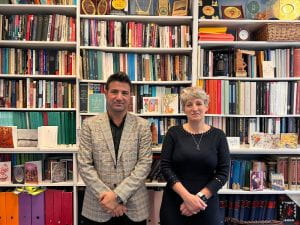Christian Cultural Heritage in Mosul
By Zainab, on 31 October 2023
We talk to Dr Abdulkareem Yaseen Ahmed, Lecturer in Linguistics at Diyala University. Dr Abdulkareem held a Nahrein – BISI Visiting Scholarship at University of Leicester. Dr Abdulkareem’s project is titled Christian Cultural Heritage in Mosul and is under the supervision of Dr Selena Wisnom.
Tell us a little bit about yourself and your background.

Dr Abdulkareem Yaseen with Professor Eleanor Robson at UCL
My name is Abdulkareem Yaseen, a lecturer at University of Diyala. My academic journey took me to the United Kingdom, where I achieved an MA from the University of York and subsequently completed my PhD at Newcastle University in 2018. Recently, I have successfully concluded a Nahrein Network/BISI-funded project in my role as a co-investigator, centered on the intricate process of identity reconstruction within the war-torn region of Karma, situated in Anbar, to the west of Iraq. This project nicely aligned with my research background, as I have previously engaged with the culturally rich community of Mosul.
What is your project about?
Well, my current project has brought me to the University of Leicester, where I’ve embarked on a mission dedicated to the preservation of the intangible cultural heritage of Mosul’s Christian community. This project is kindly supported by the Nahrein Network, based at University College London, as well as The British Institute for the Study of Iraq. Within the framework of this project, I have delved deeply into the intangible cultural heritage of Mosul’s Christian community and the considerable challenges it confronts. My research findings underscore the pivotal role played by oral traditions and dialects within the cultural heritage of this community. Moreover, I’ve illuminated how conflicts and socio-political turmoil have led to the decline of certain aspects of this intangible cultural heritage. Nevertheless, this project offers a ray of hope by outlining a comprehensive approach aimed at safeguarding and promoting the intangible cultural heritage of Mosul’s Christian community.
How was your stay in the UK?
In fact, my 8-week stay in Leicester has opened doors to new research possibilities and strengthened my commitment to safeguarding the cultural heritage of Mosul’s Christian community and beyond. Everyone at the Nahrein Network as well as the host institution (University of Leicester) has played a pivotal role in ensuring my stay was productive and enjoyable. I can’t thank them enough for what they did for me.
Have you had promising conversations or collaborations with colleagues?
During my stay in Leicester, the scholarship has undeniably broadened my horizons in multiple dimensions. Firstly, it has exposed me to a diverse community of researchers with a wide array of research interests. Interacting with these scholars has provided me with fresh perspectives and invaluable insights into various aspects of heritage preservation and cultural studies. These interactions have not only expanded my academic horizons but have also enriched my personal growth. Moreover, the Department of Archaeology has been a hub of expertise in heritage-related fields. Working closely with specialists from different research backgrounds related to heritage has given me an up-close look at their methodologies and approaches to preserving both tangible and intangible cultural assets. This exposure has deepened my understanding of the multifaceted challenges and opportunities involved in safeguarding cultural heritage. The vibrant academic environment at the University of Leicester has allowed me to engage in numerous meetings and gatherings where ideas and experiences were freely exchanged. So, I feel incredibly fortunate to have had the opportunity to engage with such fantastic individuals.
How do you plan to further your research once you’re back in Iraq?
Looking ahead, my ambitions extend beyond the boundaries of my initial project. I intend to expand the scope of my research to encompass a broader array of communities of interest. In particular, I envision a new chapter in this project that will delve into the rich history and heritage of the Jewish communities in northern Iraq. By doing so, I aim to create a more comprehensive and inclusive portrayal of Iraq’s cultural heritage landscape, shedding light on the multifaceted tapestry of traditions, narratives, and legacies that have shaped this region over centuries. This will not only deepen our understanding of Mosul’s Christian community but also contribute to a more holistic appreciation of the diverse cultural heritage that defines Iraq.

Dr Abdulkareem at UCL’s Japanese Garden Pavilion
How will your scholarship help you with your research?
Upon my return, I am wholeheartedly committed to forging enduring collaborations with the Christian community of Mosul, building upon the invaluable connections I’ve cultivated with the local residents while conducting my project. These relationships have not only enriched my understanding of their cultural heritage but have also demonstrated the genuine commitment of the community to preserving its traditions.
 Close
Close


